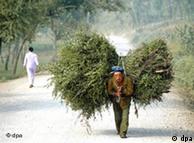雅虎讚助的勞改博物館華盛頓揭幕

這家博物館有一位引人注目的贊助人﹕互聯網巨頭雅虎公司(Yahoo)。在去年為其對中國政府逮捕 中國記者師濤提供協助的行為作公開道歉之後﹐該公司成立了一個人權基金﹐向那些“因為在網上表達自己的觀點而遭受牢獄之災的不同政見者提供人道和法律援助 ”。勞改博物館是該基金參與的第一個公共項目。根據計劃﹐雅虎首席執行長楊致遠(Jerry Yang)將為博物館開幕式剪彩併發表致詞。
在 修正自身行為的舉動之外(雅虎最近還與其他網絡巨頭聯合推出了Global Network Initiative行動計劃)﹐雅虎在促進人們關注並改善中國人權狀況方面能承擔多大的公共角色﹖雅虎目前擁有中國網絡巨頭阿里巴巴(Alibaba) 40%的股份﹐楊致遠本人還是阿里巴巴董事會成員。雅虎在中國人權問題上越是承擔突出的公共角色﹐阿里巴巴在中國的經營可能就會變得越棘手。
一些權益團體表示﹐雅虎做的還不夠。國際特赦組織(Amnesty International)美國分部在日期標注為11月6日的信件中呼籲楊致遠“充分運用其在與美、中兩國政府打交道方面的影響力”達成師濤的獲釋。楊致遠沒有立刻回復記者的採訪要求。
Geoffrey A. Fowler
(“中國日志”(China Journal)關注全球第一人口大國的發展變化﹐《華爾街日報》獲獎團隊數十位記者傾情獻稿﹐Sky Canaves主筆。歡迎讀者發送郵件至chinajournal@wsj.com或在下面評論欄中發表評論和建議。)
香港在魚飼料中檢測出三聚氰胺
香港食品安全官員發現一種來自中國大陸的魚飼料中三聚氰胺含量超標﹐不過他們表示﹐尚未在魚中發現這種物質。
出租車罷運事件考驗中國政府
11/13
德语媒体 | 2008.10.29
为什么亏本的总是农民
中国农村有七亿人口。粗算一下,每个农户的家庭成员人均拥有两亩耕地。中共十七届三中全会做出决定,今后农民可以耕种土地,也可以出租、转让和交换。同时鼓励农户合并土地,共同经营。那么,农民对这一决议反应如何?为此,柏林日报记者走访了离北京仅七十公里的河北固安县:
"对这样的想法能否得到贯彻,人们还没有信心。固安的蔬菜市场上,王雅洁站在一车黄瓜前,等待收购全部产品的大买主。这位妇女说:'对这样 的改革,我真有些害怕。'她怕的是地方当局的权力,它们可以越过农民下令土地合并,随意决定农户每年的收入。农民担心,产量提高后的赢利不是流向他们的腰 包,而是进入腐败官员的口袋。
王雅洁就曾有过不好的经历。两年前,一家工厂需要土地,征收了她家三亩地,政府给她每亩地四千元人民币补偿。她说:'开始时,我以为这是好价格,还高兴了一阵。现在我很后悔,因为我们发现,这是一笔亏本生意。'政府不给他们有选择的余地,补偿金额的多少也没有经过商谈。"
法兰克福汇报也谈到中国腐败官员勾结房地产开发商掠夺农民土地的问题:"由于买卖土地可以挣很多钱,许多地方的干部把农田变为建筑用地,把农民赶 走。""估计中国已有四千万农民就这样失去了土地。""干部和地方政府攫取土地的普遍做法引发了农村居民大规模动乱,抗议示威一再发生。"而中共中央全会 并没有解决土地问题,法兰克福汇报列举了其中的原因:
"党内的保守派害怕允许私人占有土地,这样就等于放弃了中共最后的社会主义特色。观察家认为,很可能为了顾及保守派意见,全会才以谨慎的文笔写成了决议。但与人们想象的不同,今后实际上将按照现行做法继续做下去。
自由派批评家建议,由于这样改革可能会使许多农民陷入贫困,所以最好再等一段时间。首先应在农村建立法制和资助贷款体系,使农民出售土地时不吃亏,使一切依法进行。他们也警告说,放开土地自由买卖将加速城市化,目前的中国难以承受。
但有人指出,中共中央放弃农业改革计划还有另一个原因。党显然害怕,目前的金融危机和全世界面临的经济萧条将影响中国,造成更多人失业。在此情况 下,对中国领导人重要的是,不能再增加数千万无地和失业农民,从而形成潜在的巨大动荡因素。党的领导人被迫保障农民拥有最小限度的耕地,以保证粮食供 应。"
More Tainted Eggs From China Found
SHANGHAI — Hong Kong officials said that for the second time in a week they have found a batch of eggs imported from China that contain high levels of melamine, the same industrial chemical that has been blamed for contaminating China’s milk supplies.
The announcement, which came late Tuesday from the territory’s food safety agency, is adding to growing concerns that melamine contamination may be more widespread in China’s food supplies than previously thought.
While Hong Kong officials cautioned that children and adults would have to consume a large number of tainted eggs in a single day to fall ill, the report is still another blow to China’s agriculture industry.
China is already struggling to cope with a milk scandal that has sickened over 50,000 children and caused the deaths of at least four infants this year after they consumed melamine-tainted baby milk formula. The victims suffered from kidney stones and other ailments. That case triggered a global recall of foods made with Chinese dairy products.
The Chinese government has tried to move boldly to deal with the crisis, promising to overhaul the nation’s food safety system, announcing dozens of arrests and sacking high-ranking government officials, including the head of the nation’s top quality inspection agency.
The government has blamed the dairy scandal on organized groups of scam artists who regulators say were intentionally adding melamine to milk as cheap filler in order to save money. Melamine is known to give feed and food an artificially high protein reading.
Chinese regulators say they are now investigating how melamine got into Chinese produced eggs. The government is also doing spots checks in supermarkets in some cities, such as Shanghai.
Zhang Zhongjun, an official in Beijing with the United Nations Food and Agriculture Organization, said he met late Wednesday with officials from China’s Ministry of Agriculture and was told that they believed the problem eggs found in Hong Kong were probably contaminated by melamine-tainted animal feed.
But Mr. Zhang said the government told him the source of the contamination was still unclear. “It’s not clear where the problem is from,” he said. “It’s not clear whether the melamine was added by humans or by pollution.”
Some food safety officials say that if chicken feed is contaminated with melamine, it is possible some hog and fish feed could also be contaminated. The Chinese government has not made clear in recent weeks how broadly it is testing food products for melamine.
The chemical, which is used to produce some plastics and fertilizer, was blamed last year for contaminating Chinese feed ingredients that were exported to the United States and eventually sickened dogs and cats. The case led to a major pet food recall.
On Monday, Wal-Mart Stores said some of its stores had pulled the Hanwei brand of eggs from shelves in China as a precaution after the Hong Kong government finding.
The first batch of eggs that tested positive for high levels of melamine by the Hong Kong Center for Food Safety came from a company in Dalian, a city in northeast China. Officials from the region told the state-run Xinhua News Agency that the contamination may have come from local poultry farms.
According to a notice posted on the Web site of the Dalian Hanwei Food Co., regulators in Dalian first learned on Sept. 27 that some eggs from Hanwei were contaminated. The company said they were ordered to recall eggs and exports to Hong Kong were halted by regulators in early October.
The second batch of tainted eggs found in Hong Kong came from the Jingshan Agriproducts Company in Hubei province. In a telephone interview Wednesday, Pan Fengxia, the company’s general manager, admitted that eggs tested in Hong Kong were found to have higher levels of melamine than permitted.
But Ms. Pan said she did not know how they got contaminated. “I still don’t know what happened to the eggs,” she said. “I never heard that melamine was added into feed or my products — never.”

沒有留言:
張貼留言